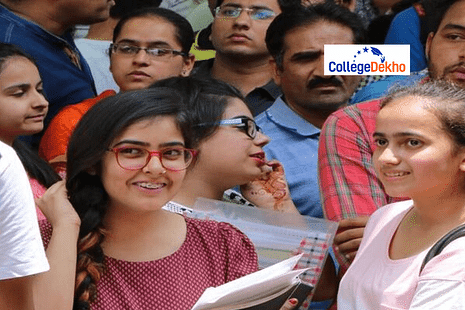
Electromagnetic Waves Weightage in JEE Main 2026 is expected to be 3.3% of the Physics Section total weightage. Test takers can expect 1 to 2 questions in the JEE Main 2026 exam. The Electromagnetic Waves chapter has primary significance in the JEE Main exam. Some of the important topics of Electromagnetic Waves are
Displacement Current, Electromagnetic Waves and their Characteristics, Transverse Nature of Electromagnetic Waves, Electromagnetic Spectrum, Radio Waves, Microwaves, Infrared, Visible, Ultraviolet, X-rays. Gamma rays, Applications of e.m. Waves, etc. The Electromagnetic Waves chapter is important as it deals with how waves are produced and what are the properties of electromagnetic waves. Aspirants of the
JEE Main 2026
. must master these topics to score well in the Physics sections.
JEE Main 2026 candidates are required to prepare for all the subjects in the appropriate manner. Aspirants of JEE Main 2026 must be aware of the chapter-wise weightage for each subject for effective preparation. Some topics with high weightage in the JEE Main physics syllabus are Motion and Equilibrium, Mechanics, Master Forces etc. Candidates can check the weightage and sub-topics of Electromagnetic Waves in the article.
Also Read: JEE Main 2026 Exam Pattern
An Overview of Electromagnetic Waves
Electromagnetic waves comprise of an electric field vector and a magnetic field vector which are both perpendicular to each other as well as the direction of propagation of the wave. Electromagnetic waves comprise topics such as Maxwell’s equations and Lorentz force formula which make all the basic laws of electromagnetism. It also comprises the concept of displacement current which helps comprehend the continuity of the current between the plates of the capacitor. It includes the electromagnetic wave velocity concept and properties of electromagnetic waves such as the transverse nature of the wave, intensity of electromagnetic waves, momentum and radiation pressure of the waves.
Types of Electromagnetic Waves
Electromagnetic waves encompass a spectrum which comprises various types, each characterized by distinct properties and applications.
- Radio Waves: Such waves have the longest wavelengths and are utilized in communication systems such as radios and broadcasting.
- Microwaves: With shorter wavelengths than radio waves, microwaves power microwave ovens, communication technology, and radar systems.
- Infrared Waves: Beyond microwaves, such waves are used in night vision technology, remote controls, and thermal imaging.
- Visible Light: The only segment perceivable by the human eye, enabling vision and serving diverse applications from photography to optical communications.
- Ultraviolet Waves: Just beyond visible light, used in sterilization, fluorescent lighting, and skin tanning.
- X-Rays: Higher-energy waves used in medical imaging (X-rays) and security screening.
- Gamma Rays: The shortest wavelength and highest energy, used in cancer treatment and exploring nuclear reactions.
Expected Electromagnetic Waves Weightage in JEE Main 2026
The expected Electromagnetic Waves Weightage in JEE Main 2026 has been provided in the following table.Units | Weightage in Percentage |
|---|---|
Electromagnetic Waves | 3.3% |
Expected Number of Questions | 1 or 2 Question |
Marks Allocation | 3 to 4 Marks (Assuming each question is worth 4 marks) |
Also Read: Best JEE Main Coaching Institutes in India
JEE Main Electromagnetic Waves Weightage of Last Five Years
Check out the last five years' JEE Main Electromagnetic Waves Weightage here.Year | Unit | Total Questions in First Session | Total Questions in Second Session |
|---|---|---|---|
| 2026 | Electromagnetic Waves | 9 (Jan Session) | 5 (April Session) |
| 2024 | Electromagnetic Waves | 8 (Jan Session) | 7 (April Session) |
2023 | Electromagnetic Waves | 8 (Jan Session) | 9 (April Session) |
| 2022 | Electromagnetic Waves | 9 (June Session) | 5 (July Session) |
| 2021 | Electromagnetic Waves + Communication Systems |
7 (February Session)
11 (March Session) | 9 (July Session) |
| 2020 | Electromagnetic waves |
13 Questions in Total
| |
| 2019 |
15 Questions in Total
| ||
JEE Main Best Books 2026 for Physics
Physics is one of the toughest papers to crack in any competitive examination since it consists of its fundamental concepts. Below are a few of the best books, which help candidates to score good marks in the JEE Main entrance exam.
Understanding Physics Electricity and Magnetism by DC Pandey
Understanding Physics for JEE Main and JEE Advanced by DC Pandey
Complete Physics for JEE main by I E Irodov
Concepts of Physics (Volume 1 and 2) by H C Verma
Problems in General Physics by I E Irodov
Important Topics of Electromagnetic Waves in JEE Main 2026
In the JEE Main 2026 exam, questions on electromagnetic waves generally cover a range of topics, focusing on the fundamental principles and their applications. The key areas of JEE Main include:
- Maxwell's Equations - They are the foundation of electromagnetic theory, including Gauss's laws for electricity and magnetism, Ampere-Maxwell law and Faraday's law of induction.
- Electromagnetic Spectrum - It includes the various types of electromagnetic waves (radio waves, microwaves, infrared, visible light, ultraviolet, X-rays, gamma rays), their wavelength ranges, along with their detection and production methods.
- Wave Properties - Concepts such as wave propagation, polarization, speed of light in various media, and wave interference are important
- Application of Theory - It involves questions where one has to apply the wave equations to scenarios involving wave behaviour, such as reflection, transmission, and energy transport via the Poynting vector.
- Numerical Problems - It comprises numerical problems dealing with the electric and magnetic fields in a plane wave, the energy transmitted by these waves and the speed of electromagnetic waves in different media.
Related Reads:
For more such updates regarding the JEE Main 2026 and other exams stay tuned with Collegedekho .
Are you feeling lost and unsure about what career path to take after completing 12th standard?
Say goodbye to confusion and hello to a bright future!

FAQs
The JEE Main exam incorporates various question types, comprising multiple-choice questions (MCQs), numerical value-based questions, as well as drawing-based questions. With MCQs, candidates must select the correct answer from the given options.
No. The JEE Mains exam alone is not enough for securing admission into an IIT. JEE Advanced is the crucial examination required for IIT admissions, and candidates are required to qualify in the JEE Main exam to be eligible for the JEE Advanced exam.
Yes, 90 is considered to be a good percentile in the JEE Main 2025 entrance exam. Candidates can secure admission into NITs, IITs or IISc Bangalore if they score a rank between 1,00,000 and 1,50,000 with a 90 percentile in the JEE Main exam.
Mathematics is often considered to be the most challenging subject in the JEE Main exam, but its difficulty level varies from person to person. Some students may find other subjects more challenging based upon their strengths and weaknesses.
NCERT books are very important to prepare for the JEE Main 2025 exam. The JEE Main exam follows the CBSE syllabus for 11th and 12th classes, so NCERT books are considered to be the most reliable and necessary study materials. NCERT books explain basic fundamental concepts in a simple and clear way.
To score a 99+ percentile in the JEE Main 2025 exam, candidates require more than just knowing the JEE Main syllabus, as it required consistent practice, strategic revision, time management, and the ability to solve complex problems under pressure. However, with the appropriate resources, one can achieve these requirements.
All sections namely Mathematics, Physics, and Chemistry are mandatory in the JEE Main exam, with questions covering the entire JEE Main syllabus. To be eligible for admission, candidates must achieve the minimum qualifying marks in each subject and the overall aggregate.
Candidates can study from the NCERT textbooks of class 11 and 12 Physics, Chemistry and Mathematics to cover the JEE Mains syllabus. No changes have been made to the JEE Main Syllabus 2025. NTA removed several topics of Physics, Chemistry and Mathematics last year from the JEE Main syllabus.
Candidates must keep in mind that there is no requirement of 75% marks in class 12 for appearing in the JEE Mains exam. The JEE Main eligibility criteria of minimum 75% marks in class 12 is required at the time of securing admission across NITs, IIITs and GFTIs. Candidates can apply and appear in the JEE Mains 2025 exam irrespective of their class 12 marks.
Previous year question papers are an important source for the JEE Main preparations. However, relying solely upon PYQs is not enough to fully prepare for the JEE Mains exam. Candidates must also focus on covering the entire syllabus, developing strong conceptual understanding, practising time management, and attempting mock tests.
Was this article helpful?





















Similar Articles
Polytechnic Admission 2026: Entrance Exams, Application Form, Eligibility Criteria
KCET Exam Day Instructions 2026 - Documents to Carry, OMR Instructions, Dress Code
Top BTech Colleges Accepting CUET Score 2026
JEE Advanced 2026: Top 5 Preparation Tips and Tricks
How to Prepare for JEE Main, JEE Advanced while in Class 12
JEE Mains & JEE Advanced Exam Pattern 2026: All You Need to Know